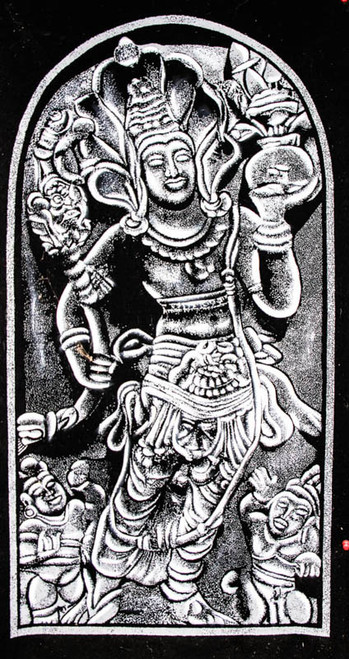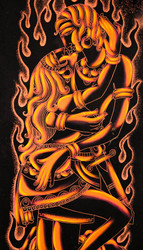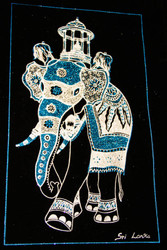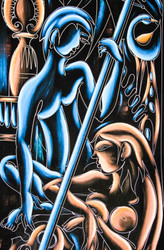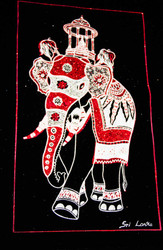Guardstone - Muragala - Velvet Art
Product Description
The guardstone or “muragala” were one of an association of three aspects of sculpture that adorned the entrance to buildings in ancient times, the other two being the moonstone (Sandakada Pahana) and balustrade (Korawak Gala) .
The guardstones, which provided a support to the heavy stone balustrade, were plain in the beginning. Later they came to be sculptured with symbols significant of prosperity and protection.
More info:
Courtesy of: Guardstones (Ancient Muragala) - මුරගල | AmazingLanka.com
The cobra was considered the guardian of water and treasure. Zoomorphic sculptures of multi headed cobras have been found at the sluices of reservoirs, and at the four corners of relic chambers enshrined in “dagabas”
The concept of protection could have arisen out of popular belief that when people die they are reincarnated as cobras to protect the treasures they had buried in their previous lives.
This idea of protection could have been incorporated in the third and final stage of development not as a zoomorphic symbol, but as an anthropomorphic one of a cobra-king or naga-raja.
The naga-raja is gracefully carved to indicate movement and poise. In one hand he holds the pot of plenty (punkalasa) and in the other a sprouting branch complete with leaves, buds and flowers.
The body is princely dressed and ornamented. Around the head is a five-hooded, seven-hooded and occasionally a nine-headed cobra hood.
This indicates that the naga-raja has taken the place of the bahirawa as a guardian of wealth and harbinger of prosperity. Sankha and Padma have been diminished to two minorfigures or gana at the feet of the naga-raja. There may be one or two gana on the guardstones.
The very best naga-raja guardstones may be seen at the Ratanaprasada in Anuradhapura and the Vatadage in Polonnaruwa. In the Polonnaruwa guardstone there are two gana and only one at the Ratanaprasada. The headdress and ornaments of the naga-raja figures have been exquisitely moulded.
In the Ratnaprasada guardstone, the arch above the figure is also profusely carved. There is a double “makara” head at the apex, and a “makara” head at each end of the base of the arch. Lions and dancing human forms spill out of the mouths of the “makara”.
Read more: Guardstones (Ancient Muragala) - මුරගල | AmazingLanka.com
 Loading... Please wait...
Loading... Please wait...









